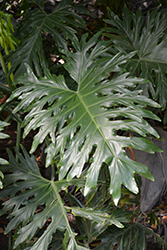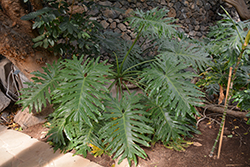Height: 15 feet
Spread: 15 feet
Sunlight:
![]()
![]()
Hardiness Zone: (annual)
Other Names: Cut Leaf Philodendron, Philodendron bipinnatifidum
Description:
A dense, tree like tropical plant with deeply dissected, lobed green leaves that are glossy; foliage arches downward from trunks that show former leaf scars; great for containers or as a tropical landscape accent
Ornamental Features
Tree Philodendron's attractive deeply cut lobed pinnately compound leaves remain green in colour throughout the year on a plant with an upright spreading habit of growth.
Landscape Attributes
Tree Philodendron is a dense multi-stemmed evergreen tropical plant with an upright spreading habit of growth. Its wonderfully bold, coarse texture can be very effective in a balanced garden composition.
This is a relatively low maintenance plant, and is best cleaned up in early spring before it resumes active growth for the season. It has no significant negative characteristics.
Tree Philodendron is recommended for the following landscape applications;
- Accent
- Mass Planting
- General Garden Use
- Container Planting
- Hanging Baskets
Planting & Growing
This plant is native to the tropics and prefers growing in moist environments with evenly warm conditions all year round. In our climate, it is usually grown as an outdoor annual in the garden or in a container. If you want it to survive the winter, it can be brought in to the house and provided with special care, and then returned to the garden the following season. In its preferred tropical habitat, it can grow to be around 15 feet tall at maturity, with a spread of 15 feet. However, when grown as an annual or when overwintered indoors, it can be expected to perform differently, and its exact height and spread will depend on many factors; you may wish to consult with our experts as to how it might perform in your specific application and growing conditions.
This plant does best in partial shade to shade. It prefers to grow in average to moist conditions, and shouldn't be allowed to dry out. It is not particular as to soil type or pH, and is able to handle environmental salt. It is somewhat tolerant of urban pollution. Consider applying a thick mulch around the root zone in winter to protect it in exposed locations or colder microclimates. This species is not originally from North America, and parts of it are known to be toxic to humans and animals, so care should be exercised in planting it around children and pets. It can be propagated by division.
Tree Philodendron is a fine choice for the garden, but it is also a good selection for planting in outdoor containers and hanging baskets. Its large size and upright habit of growth lend it for use as a solitary accent, or in a composition surrounded by smaller plants around the base and those that spill over the edges. It is even sizeable enough that it can be grown alone in a suitable container. Note that when growing plants in outdoor containers and baskets, they may require more frequent waterings than they would in the yard or garden.
-- THIS IS A TROPICAL PLANT AND SHOULD NOT BE EXPECTED TO SURVIVE THE WINTER OUTDOORS IN OUR CLIMATE --
Disclaimer - This resource is provided for informational purposes only and does NOT reflect current availability. Inventory varies seasonally, so we cannot guarantee that every plant will be in stock at all times - please contact your favourite GardenWorks location directly for current availability. It does not include our entire inventory of plants, so be sure to visit GardenWorks to see varieties that may not be represented on this list.


